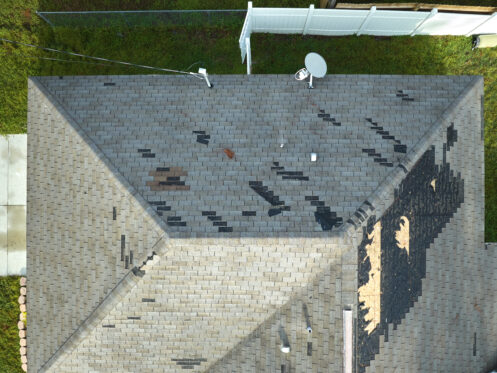Tornadoes have become an increasing problem throughout the state of Georgia in recent years, bringing significant damage to homes and residences. Recovering from these storms can be an extensive process, sometimes taking several months to re-establish normalcy. You might not be able to do much to prevent tornadoes from occurring. However if you prepare yourself with the appropriate knowledge and protocols, you can ensure that you, your family and your loved ones are safe. Here, we’ll cover critical information and processes that you need to know about in order to help you restore your home’s integrity after a tornado.
1. Inspect Damages & Safety Issues
Before Georgia homeowners begin the process of recovery, they have to make sure it is safe enough to return home. After you receive word from local officials that it is safe to return home, the first order of business is assessing the damage to your household. This process is essential to file your insurance claims, and properly documenting the damage ensures that you get proper coverage.
While you should personally do preliminary inspections of your property, more professional assessments may be necessary. In this situation, hiring a public adjuster is a wise decision. They’re professionally trained to help you properly issue and settle insurance claims on your behalf. Their assistance can be the difference between getting the compensation you need and missing out on crucial coverage necessities. They’ll ensure that the damage is properly documented, ensuring that you can get the most out of your settlement claim.
2. Contact Your Home Insurance Provider
The next step you’ll want to take is contacting your insurance provider. If you have homeowner’s insurance, your policy likely provides some form of tornado coverage. However, the coverage you do receive can vary based on your policy terms. Some coverage strictly covers the structures that make your home up, including the roof, windows, walls and other essential elements. Other forms of coverage will help cover lodging costs if your home is temporarily uninhabitable, so you need to know exactly what your policy offers for your relief needs.
While many homeowner’s policies cover an extensive variety of damages, there are some potential issues that these policies don’t cover. If the tornado damage results from a flood, most homeowner’s coverage will not apply. Homeowner’s insurance can also run into roadblocks when covering high-value items like precious stones and metals, artwork, jewelry and collector’s items. If you want to insure your home for either of these issues, you’ll need to add additional coverage for them.
3. Register With Federal and Local Assistance
Aside from insurance, many Georgia homeowners will also qualify for local and federal assistance benefits to help you manage the recovery process. The most notable source of disaster relief assistance comes from FEMA, which provides federal aid to those suffering from the impact of natural disasters. Their resources can be extremely important for those who need supplemental funds for damage recovery, including flooding and other issues that insurance doesn’t cover.
Registering for FEMA assistance is relatively simple to start, but you want to make sure that you have as many appropriate documents as you can gather. This includes identification, home and current living addresses (if applicable), insurance information, and damage reports. FEMA cannot cover issues that your insurance takes care of, but it can provide additional coverage if they assess that your insurance settlement was insufficient.
4. Schedule Insurance and FEMA Inspections
Both FEMA and your insurance provider will need to conduct their own inspections to validate the damages you are reporting. You’ll need to schedule these inspections in order to receive your claim settlement and federal assistance funds. Moreover, depending on the extent of your damages, there may be multiple inspections to take care of.
During the inspection, it’s important to make sure that the inspectors evaluate all the damage your home goes through. It can be helpful to have all of the documentation and damage reports you’ve compiled with your own inspections. This is so that you don’t miss anything, ensuring you get the coverage and services you need.
5. Replace or Recover Important Documents
Due to the ravages that tornadoes can do on your home, it’s highly likely that official documents and records will be compromised. If you want an easy way to safeguard against this problem, you can help protect your documents by backing them up on digital cloud devices. Since official identification documents like your Social Security card and birth certificate can be essential for federal assistance, digital copies can help you apply even if the physical copies are lost.
6. Start Cleanup
When a tornado hits your home, it’s easy to desire a sense of balance and equilibrium. However, cleaning up the damage to your home needs to be a very careful process. From a personal standpoint, you should only clean up debris and damaged items that you know are safe for you to work with. Much of the damage may require qualified groups or agencies to safely conduct the cleanup process.
It’s also important to note that you should conduct your aid and insurance inspections prior to cleanup. If you begin extensive cleaning before your inspections, you might sabotage yourself from receiving the coverage and aid that your house needs. If damages to your home prevent you from living there before the inspection can begin, document your lodging or repair costs until the inspections can take place.
7. Connect With a Trustworthy Contractor
When the time comes to schedule damage repairs, you’ll want to work with experts who have a trustworthy and credible track record. Using unverified contractors can not only waste your time, energy and money, but they can perform work that produces hazards to you and your family’s safety. You want contractors who are licensed and insured in the state of Georgia to perform the services that you need to get your home back in excellent condition.
Make Sure Home’s Integrity Is Secure After a Tornado Storm
Restoring your home after a tornado storm can require a lot of steps and careful planning, but residents from throughout the great state of Georgia don’t have to do it alone. At Fraser Roofing, LLC, we help homeowners in North, Central, Newman, Statesboro, and Metro Atlanta, GA restore their home roofs after a tornado touches down. Not only do we help homeowners restore their roof’s condition after a tornado, hurricane or other natural disasters, but Fraser Roofing, LLC is here to fulfill all of your roofing needs.
Including services like roof leak repair, gutter replacement, reroofing, shingle roofing and complete storm damage restoration, we have every facet of your home’s roofing demands under control. We’ve served our neighbors for over two decades with reliable, trustworthy and highly accredited services that protect your home’s primary defense against the southern heat, wind and rain. For more inquiries on how we can help you recover from a ravaging tornado storm or any of our other important roofing services, contact us today.

